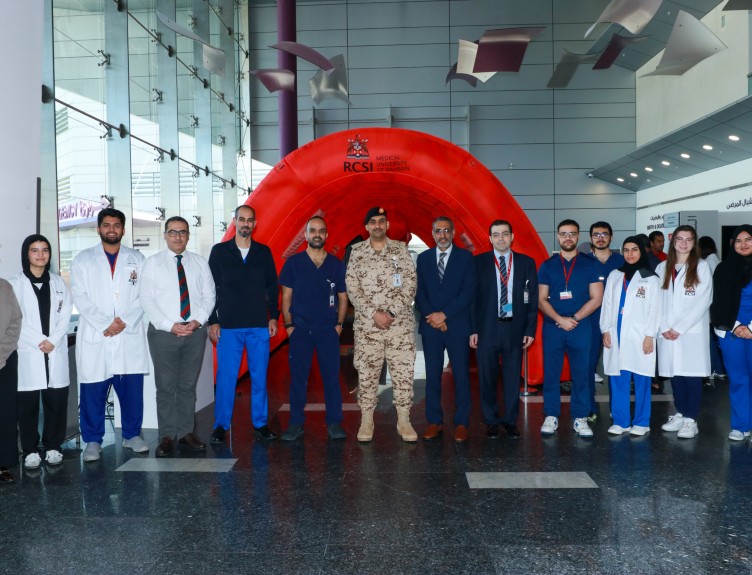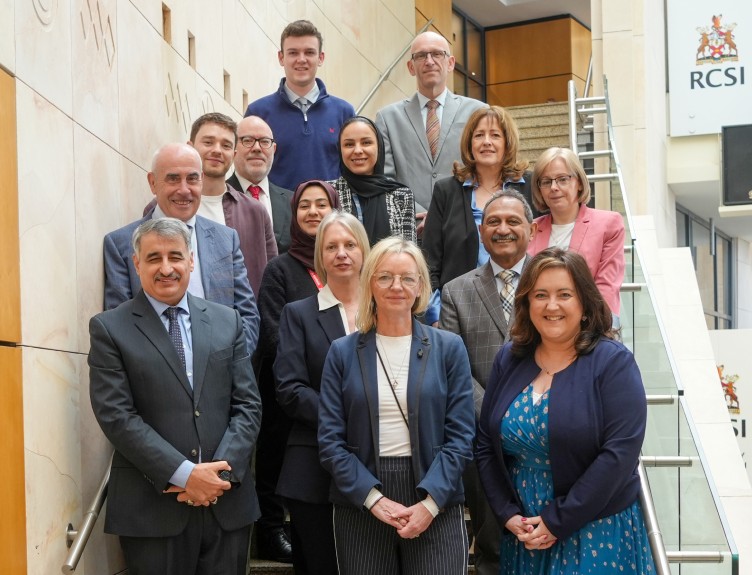RCSI Medical University of Bahrain Advocates for Increased Colorectal Cancer Awareness

The Royal College of Surgeons in Ireland (RCSI) – Medical University of Bahrain organised a public campaign to raise awareness about Colorectal – related to Colon and Rectum- Cancer (CRC) with the support of 150 medical and nursing students.
Held in collaboration with the King Hamad University Hospital and the King Hamad American Mission Hospital, this campaign led by Professor Hussain Nasaif, Associate Professor in Nursing and Director of the MSc in Nursing Programme at RCSI Medical University of Bahrain, with the support of the Community Engagement Office, aimed at raising awareness about the early symptoms and risk factors of Colorectal Cancer.
As part of this initiative, over 250 individuals who visited both hospitals over the course of four days were demonstrated how CRC develops within the colon by our student volunteers using an inflatable colon model as an effective educational tool.
Colorectal – related to Colon and Rectum- Cancer (CRC) continues to pose a significant public health challenge in the Kingdom of Bahrain, with data highlighting the increase in new cases and the need for improved awareness, early detection and preventive measures.
According to the latest statistics from the World Health Organization’s International Agency for Research on Cancer (IARC), Colorectal Cancer emerged in 2022 as the most commonly diagnosed cancer among men in the Kingdom of Bahrain, with an incidence rate of 14.8%. Among women, it is the second most common cancer, following breast cancer, with an incidence rate of 8.2%. When compared with figures from the wider West Asia region—9.7% among men and 8.7% among women—CRC appears more prevalent among Bahraini men, while the rate among women remains broadly similar.
Negative lifestyle factors, including smoking, alcohol consumption, obesity, a diet high in processed foods, fatty food, low fibre diet, and physical inactivity significantly contribute to the risk of developing Colorectal Cancer. Conversely, a balanced diet combined with regular physical activity can lower the risk and improve overall health outcomes.
Common symptoms of CRC include blood in the stool, incomplete bowel emptying, lower abdominal pain, unexplained weight loss, loss of appetite, fatigue and anaemia. Individuals experiencing these symptoms are advised to consult their family doctor to review their personal and family medical history and explore available CRC screening options. Regular CRC screening is recommended from the age of 45 for both men and women. Early detection dramatically increases the likelihood of successful treatment and patients’ survival rate.
Professor Sameer Otoom, President of RCSI Medical University of Bahrain, commented: “We are grateful to our partner hospitals for hosting and supporting our Colorectal Cancer awareness initiative. Our collaborative effort in engaging the public and extending the relevant healthcare services is critical in tackling this prevalent disease for the benefit of all people in the Kingdom of Bahrain. Such partnerships strengthen our mission to enhance community health through education, research, and service.”
RCSI Medical University of Bahrain remains committed to empowering the public with the knowledge and resources necessary to reduce the impact of Colorectal Cancer, as well as other prevalent diseases and health conditions. By fostering a culture of education, early detection, and prevention, we continue to play an active role in supporting the health and wellbeing of individuals and communities across the Kingdom of Bahrain.



